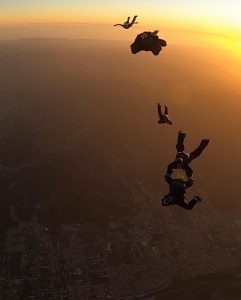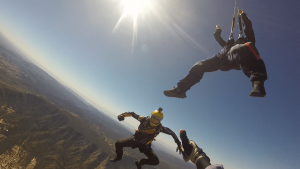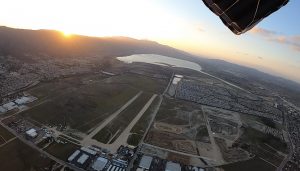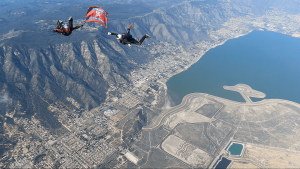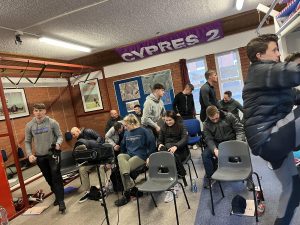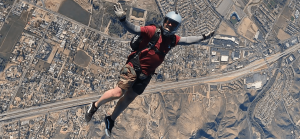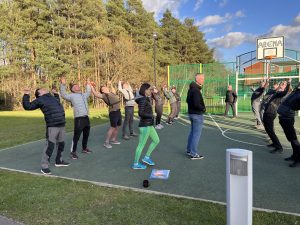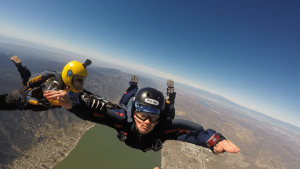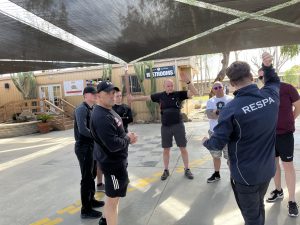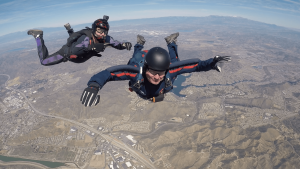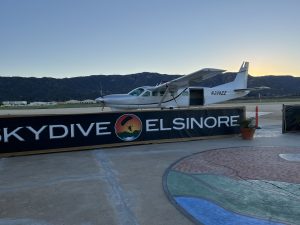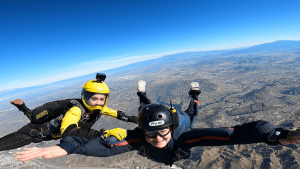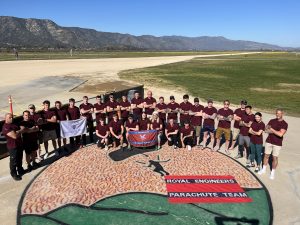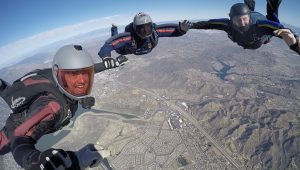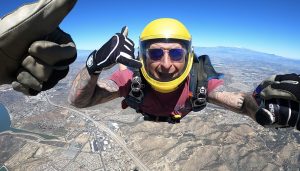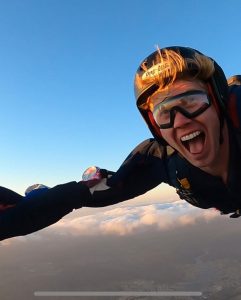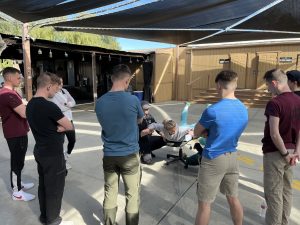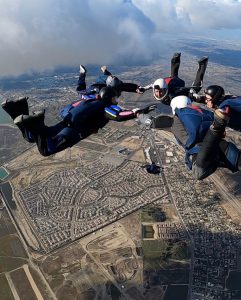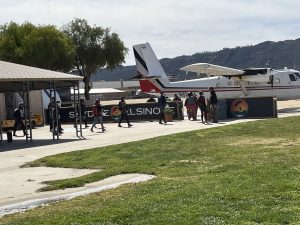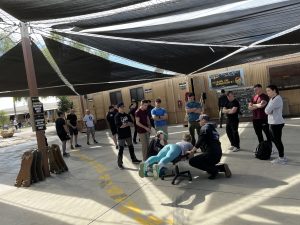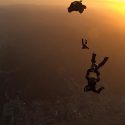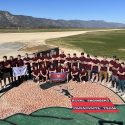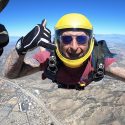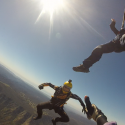Expedition Report: Exercise EAGLES DESCENT, Lake Elsinore, California, 25 Feb – 15 Mar 22.
Ulysses Trust ID 2773.
23 Parachute Engineer Regiment.
EAGLES DESCENT was a level 3 adventurous training expedition to Skydive Elsinore, USA, facilitated by Royal Engineers Sports Parachute Association (RESPA), delivering Accelerated Freefall (AFF) parachuting to 16 students & continuation training for 9 personnel from 23 Para Engr Regt. This included 4 members of 299 Para Sqn our Reserve Sqn and a reservist instructor. In total, 5 AFF instructors taught on the expedition. The students gained an internationally recognised skydiving license, allowing them to solo skydive at any location worldwide. The experienced parachutists worked towards coaching qualifications and learned other disciplines of freefall skydiving – including tracking, free-flying and canopy handling.
The planning for trip started in Sep 19 to provide a valuable AT opportunity for 23 Para Engr Regt personnel at the end of a busy and demanding year, but due to the pandemic, the dates and location moved several times until clearance was finally given for February 2022.
Skydive Elsinore is a civilian drop zone (DZ) located on the west coast of the United States of America. The overriding driver in selecting this drop zone was the high likelihood of suitable weather conditions for student parachuting in the month of February/March. Additionally, Skydive Elsinore has the airframes and infrastructure (including a large Parachute Landing Area (PLA)) to train and administrate a large expedition, comprising mainly of student parachutists.
All sixteen students completed the Accelerated Free Fall (AFF) course gaining the British Skydiving (BS) A Licence, qualifying them as safe, solo skydivers and removing their student status. Students must develop robust coping strategies to not only overcome the initial fear of voluntarily jumping out of a perfectly good aircraft, but also to motivate themselves to carry out rehearsed drills and react to in-air signals given to them by their instructors once they have exited the aircraft. Two of our students found the first week particularly difficult but after some extra time with the instructors and in the wind tunnel, in week 2 they came into their own and achieved their goals.
The experienced cohort achieved ten BS recognised qualifications and worked together to enhance the overall quality of the group skydiving in several disciplines. The experienced participants were challenged through undertaking new disciplines including formation skydiving, free flying and tracking. Exposure to new disciplines continues to develop the individual and experienced jumpers gain valuable experience assisting those of lesser experience to gain qualifications.
The Ulysses Trust grant was invaluable to the trip. It allowed us to provide each student with 1 to 1 wind tunnel training prior to jumping, and during the trip to improve skills and help those who needed some extra help. Without the generous grant, not all the students would have gained their A licence, and the trip would not have achieved one of its aims.
As part of validating the exercise, feedback from the parachutists was sought. Most of the student parachutists reported that they had underestimated the level of fear that they had to overcome in undertaking parachuting. In addition, the students understood the risk behind the various phases of a parachute jump, the purpose of the equipment and how it operated to mitigate the risk of death or serious injury. Within the experienced cohort, a number reported that the ability to be able to partake in a challenging, overseas AT is the sole reason they have remained in the British Army. Therefore, it is assessed that the exercise has met the aim of adventurous training and highlights the contribution of this low-cost AT exercise to the retention of service personnel and the moral and physical components of fighting power.
LCpl R Holden, one of the experienced group, with 30 jumps prior to the expedition said:
“In the experienced group there was a broad spectrum of abilities, this ranged from people with just over 30 jumps to people with closer to 400. Regardless of jump numbers, throughout the duration of the exercise every skydiver managed to develop their skillset further; whether it be the students jumping for the first time or experienced jumpers honing specific skills. There were three of us in the experienced group that had both our ‘FS1’ (Formation Skydiving Qualification) and ‘B License’ to work towards while out there. Due to the mixture of abilities in this group, it was possible for each to have our own 1 on 1 coach to bring us up to speed and eventually qualify within the first few days of the trip. This then allowed us to work on our ‘FS’ skillset with each other whilst also chipping away at the B License. Every ‘experienced’ member averaged just over 30 jumps in the 10 days we spent at the drop zone. Going forward we now aim to compete at the Armed Forces Parachute Championships in July as a novice team. All in all, it was a successful trip with many new qualifications being achieved as well as plenty of time to explore and enjoy the local area.”
Spr W Jones, one of the students, with no parachuting experience before the trip said:
“On the 26th of February 2022 myself and members of 23 Para Engineer Regiment landed in America. We had an introduction to the parachute DZ (drop zone), and some refresh training before people started jumping out of the aircraft at 13,000ft. To help improve our technique & form we did some minutes in the wind tunnel. We jumped multiple times every day in the California heat and all of us achieved our Skydiving A License, meaning we could jump anywhere in the world. Personally, I underestimated how much mental concentration would be needed to skydive, remembering body positions, hand signals and altitude awareness, all while falling the earth at 120mph! But we were all in the same situation, so leaned on each other and the instructors, who were very good. When not jumping it was a great experience to visit LA, San Diego and Las Vegas. Once we were qualified, we jumped out of a ‘skyvan’ where we could be more creative with our exits before going into free fall. I look forward to carrying on with the sport and learning how to pack my own parachute. This was one of those trips that makes you realize why we joined up”

